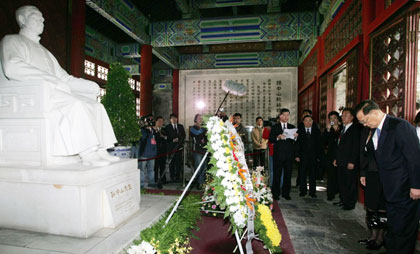Lien pays tribute to Sun Yat-sen's cenotaph
(Xinhua)
Updated: 2006-04-15 16:07
Honorary Chairman Lien Chan of the Taiwan-based Chinese Kuomintang party
Saturday morning paid a tribute to a cenotaph of Dr. Sun Yat-sen.
The
cenotaph containing personal effects of Dr. Sun Yat-sen (1866-1925), the
forerunner of anti-feudalism revolution in China, is located at Biyun Temple on
Fragrance Mountain of western Beijing.

Lien Chan (R), former
chairman of Taiwan's opposition Kuomintang, bows to a statue of Sun
Yat-sen, the father of the revolution that toppled China's last emperor in
1911, during a visit at the Biyun Temple in Beijing April 15, 2006. Taiwan
opposition politicians and Chinese Communist leaders urged Taipei on
Friday to allow regular direct flights and expand trade with China,
raising pressure on the island's independence-leaning leader.
[Reuters] |
Sun passed away on March 12, 1925
and, on April 2, his coffin was temporarily moved into a pagoda in the temple.
The pagoda became Dr. Sun's burial site in May 1929 and, afterward his remains
was moved to the mausoleum in Nanjing of east China's Jiangsu Province. But his
clothes and hats were left behind in the pagoda.
The temple contains Dr.
Sun Yat-sen's Memorial Hall, which houses a full-sized white-marble statue of
Dr. Sun Yat-sen.
Upon his arrival at the temple in the morning, Lien
placed a yellow garland in the names of Lien Chan and all KMT members. Lien and
his delegation made three bows in front of the statue.
Then, they were
showed around to see Dr. Sun Yat-sen's works.
The Chinese nationality
now face the rare opportunity for development and prosperity, and the promotion
of economic development, people's welfare, as well as peace, prosperity and
mutual benefit across the Taiwan Straits serve Sun's wish, Lien said.
Lien came to Beijing to attend a cross-Straits economic and trade
forum.
|